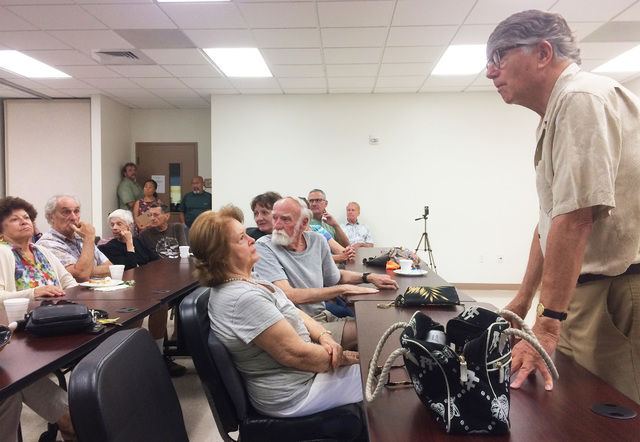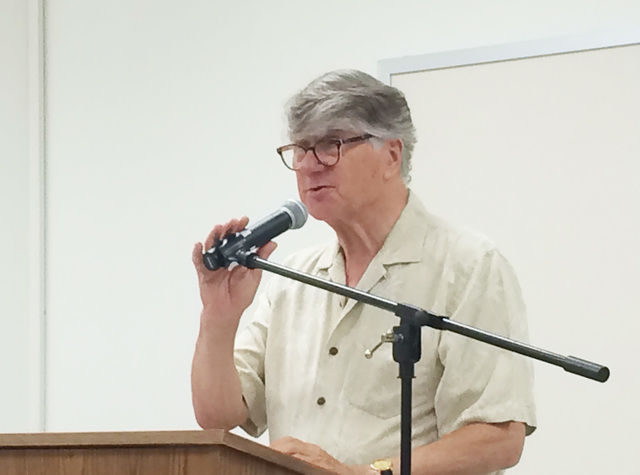PUHI — Diana Puahala says her mother never believed Adolph Hitler’s concentration camps existed. “My mother was a Nazi,” Puahala said. “Growing up, she always said not to believe all that stuff America says about there being concentration camps in
PUHI — Diana Puahala says her mother never believed Adolph Hitler’s concentration camps existed.
“My mother was a Nazi,” Puahala said. “Growing up, she always said not to believe all that stuff America says about there being concentration camps in Germany. She never would believe it.”
Puahala’s mother died two years ago. Now, Puahala looks for opportunities to learn about the time period that shaped so much of her family’s history.
The possibility of new perspectives on the Nazi party brought her to Kauai Community College’s Global Cafe on Monday to hear Siegfried Streufert, a Kalaheo resident for the past eight years.
He was born in 1934 in Berlin and his father, August Streufert, was a senator in the German Republic, which was declared an enemy of the state after the Nazi party took power. Eventually, his father was captured by the Nazis and sent to a concentration camp, where he died at the age of 57.
Streufert’s talk was entitled “Growing up in Nazi Germany: Death and Survival in a Vicious Dictatorship.”
For a little over an hour, Streufert captured his audience, about 40 people strong. He talked of nightly bombings on his childhood town of Kiel, Germany, forest rendezvous laced with anti-Nazi plans and of smuggling those people marked for death to safety under the cover of darkness.
His stories were told from the perspective of a child because World War II started when he was five and continued until he was around 10 years old.
“There are two things that influenced my life when I was living in Kiel,” Streufert said. “One, of course was the Nazi persecution, which we experienced personally over and over again, and the other thing was the war.”
Streufert’s memories of the war revolved around the near-constant bombings that hammered Kiel. He lived in a subdivision eight miles outside of town and even his neighborhood was hit at one point.
“I remember when I was about 5, there was a bomb and it was so loud,” Streufert said. “The glass from my window shattered all over me and I remember running out for my parents, asking what happened.”
Usually, Streufert said, the family just watched from afar as the Americans bombed Kiel during the day and the British dropped their payloads at night.
Streufert said the push to join the Nazi party was just as constant and dangerous as the bombings.
“Everybody knows about the concentration camps, but what they don’t hear as often is that the Nazis re-invented the French guillotine,” Streufert said. “If you had the wrong thing, the wrong book, or had anything anti-Nazi, then they’d just take your head off.”
Life for Streufert in Kiel was guarded because his family possessed all sorts of anti-Nazi paraphernalia — from a radio that got the forbidden British and American stations to a secret picture that hung on their wall and books that were disguised with pro-Nazi book jackets.
August even partnered with a local dentist to help shuttle anyone marked for a concentration camp out of the country.
“He had an extra room in the back of his dentistry where he would hide people and then my father would pick them up in the middle of the night and take them to a German fishing boat,” Streufert said. “Then that German fishing boat would take them to the middle of the Baltic Sea and they’d be transferred to a different fishing boat — like one from Sweden that would take them to a safer country.”
All that came to an end one summer morning in 1944 when August was arrested and taken to a concentration camp.
“I still remember, he looked at the window and could have jumped out the window and disappeared,” Streufert said. “But then he looked at me and at his wife and he said he couldn’t do that.”
August was allowed to write his family once a month from the concentration camp and Streufert said he and his mother received letters every month until December.
There was no word concerning August until April 1945, when Streufert received a package from the head of the concentration camp.
On the package was written “enclosed are the clothes and ashes of August Streufert, who died in a concentration camp on 27, December, 1944.”
“It said he and many others that night had died of supposed pneumonia,” Streufert said. “The mayor of the city I grew up in investigated that and wrote a book on my father. These people were evidently and apparently intentionally killed.”
Streufert said he and his mother buried the ashes, but he’s still not sure to this day what those ashes actually were.
“They had plenty of ash to work with,” said Streufert, who retired from teaching at Penn State College of Medicine and is the author of 13 books and several scientific papers.
Streufert wrapped up his talk with a warning. He highlighted examples all over the world of the same kind of intolerant regimes rising to the detriment of the people.
“You’ve got people who are absolutely persuaded that they’re right and they have no acceptance of anyone who is in the least bit different because being different makes you a criminal,” he said. “And it happens over and over again.”
•••
Jessica Else, county reporter, can be reached at 245-0452 or jelse@thegardenisland.com.



